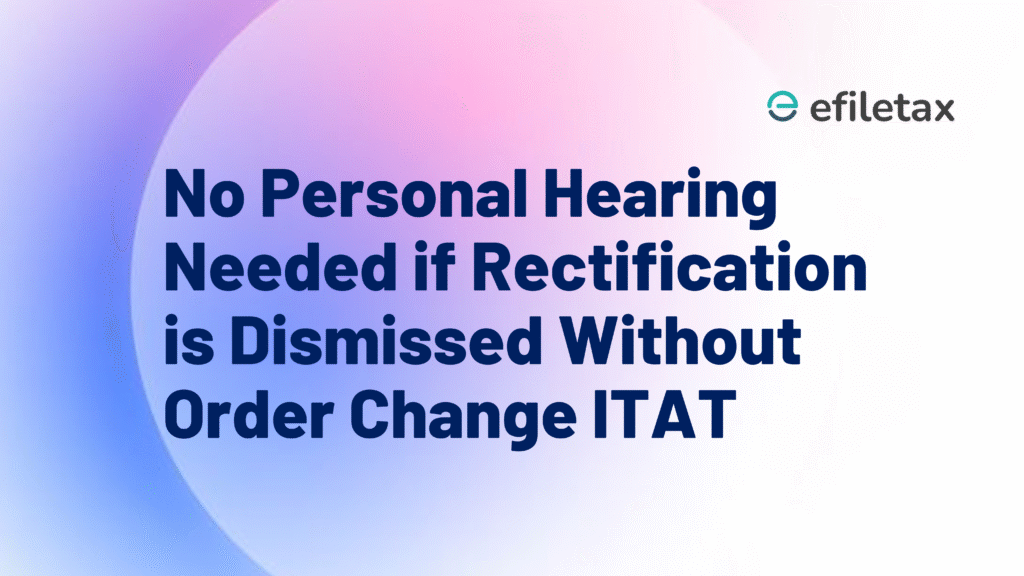
Dismissal of Rectification Application: When Is Hearing Mandatory?
If your rectification application under Section 154 is dismissed without modifying the original assessment order, the tax authorities are not bound to grant a personal hearing, says a recent Income Tax Appellate Tribunal (ITAT) decision.
This principle matters for taxpayers filing rectification requests—especially when relying on procedural fairness or natural justice as a defence.
Let’s break it down.
What is a Rectification Application Under Section 154?
Section 154 of the Income-tax Act, 1961 allows an Assessing Officer (AO) to rectify any mistake apparent from the record in orders passed under the Act.
You can file a rectification application for:
- Clerical or factual errors
- Omission to consider TDS credits
- Arithmetical mistakes in tax computation
- Incorrect carry forward of losses or MAT credit
But here’s the catch — only “apparent” mistakes are allowed. Anything debatable won’t qualify.
Key Ruling: No Hearing Needed If No Order Change
In the case of Nayara Energy Ltd vs. DCIT, the ITAT held:
“When an application under Section 154 is summarily rejected without altering the original order, it does not violate the principles of natural justice, even if a personal hearing was not granted.”
This means:
- If your application is dismissed without amending the assessment, no hearing is legally required.
- The AO isn’t obligated to issue a fresh show cause notice or conduct a hearing.
- However, if any adverse modification is made to the original order, a hearing becomes essential.
Legal References Supporting This View
- Section 154(3): Allows rectification without prior notice unless the modification is adverse to the assessee.
- SC ruling in Smt. Maneka Gandhi v. Union of India (1978): Natural justice is a flexible concept and depends on nature of action.
- CBDT Instructions: There is no mandatory requirement for hearings unless assessment outcome is being changed.
Expert View: Be Precise in Rectification Filing
“Many rectification pleas fail because the mistake is not apparent. Always back your application with clear records—like 26AS mismatches, AIS data, or CPC intimation errors. Don’t expect a hearing unless the department modifies your original return.”
— Senior CA, Efiletax Panel
Practical Tips for Taxpayers
- ✅ Keep it factual: Avoid legal arguments in Section 154 – stick to objective data.
- ✅ Track processing: Use your income tax e-filing portal to check rectification status.
- ✅ Know your rights: You can escalate to CIT(A) if rectification rejection leads to adverse consequences.
- ✅ Use correct form: File rectification online using appropriate reasons (TDS, MAT mismatch, etc.).
FAQs
Q1. Is a hearing mandatory if AO accepts rectification partially?
Yes, if the rectification modifies the order adversely in any way, hearing is necessary.
Q2. Can I re-file rectification if it’s rejected?
Yes, if you have fresh evidence or if the mistake was not clearly shown earlier.
Q3. Can I challenge rectification rejection before CIT(A)?
Yes, if the rejection results in continued error or affects tax liability, you can file an appeal.
Summary
If a Section 154 rectification request is dismissed without altering the original assessment, tax authorities are not required to offer a personal hearing, says ITAT. Hearing is only mandatory if order is changed adversely.